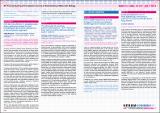Por favor, use este identificador para citar o enlazar a este item:
http://hdl.handle.net/10261/263998COMPARTIR / EXPORTAR:
 SHARE
BASE SHARE
BASE
|
|
| Visualizar otros formatos: MARC | Dublin Core | RDF | ORE | MODS | METS | DIDL | DATACITE | |

| Título: | Understanding the role of RAS signaling in the tumor microenvironment of KRAS-driven lung cancer |
Autor: | Castellano, Esther CSIC ORCID CVN | Fecha de publicación: | 19-jul-2021 | Citación: | 43rd Annual Meeting of the SEBBM (2021) | Resumen: | Lung cancer is the leading cause of cancer-related death with a survival rate of less than 5%, mostly due to patients presenting with metastatic disease and developing resistance to therapy. Recently, molecularly-targeted agents (e.g. against EGFR or ALK) and immunotherapies (anti-PD1 antibodies) have been approved for treatment of NSCLC. However, it remains a challenging disease, particularly in KRAS-mutated cases, which are associated with an even worse prognosis and do not benefit from targeted agents. KRAS inhibitors currently in clinical development hold promise, but only for patients with a specific, relatively uncommon, mutation (G12C). We have found that RAS signalling through PI3K has a significant impact on tumour progression by acting over the tumour microenvironment. Proteomic analysis of KRAS-driven lung tumours lacking RAS-PI3K interaction suggested a dependency for this signalling pathway in functions typically related to CAFs. Further analysis confirmed that TGF-b activated fibroblasts deficient for RAS-PI3K interaction displayed changes in CAFs markers such as YAP1, a-SMA, vimentin or fibronectin. This was accompanied by a reduction in the ability to contract collagen gels, impairment in cytoskeleton rearrangement and formation of thinner and more disorganised matrices. Furthermore, our data also revealed that proliferation of KRAS mutant lung tumour cells is highly impaired in those matrices generated by CAFs lacking RAS-PI3K. In vivo analysis of tumour stiffness showed that lung tumours lacking RAS-PI3K interaction are softer. In summary, our data suggest an overarching effect of RAS signalling through PI3K in the formation of a pro-tumorigenic extracellular matrix by controlling CAF activation and function to modulate tumour cell behaviour. The high prevalence of RAS mutations in human cancer and the presence of CAFs in all tumours means that these results have far-reaching implications and point to new ways to tackle RAS-driven tumours. | Descripción: | Trabajo presentado en el 43rd SEBBM Congress, celebrado en Barcelona (España) del 19 al 22 de julio de 2021. | URI: | http://hdl.handle.net/10261/263998 |
| Aparece en las colecciones: | (IBMCC) Comunicaciones congresos |
Ficheros en este ítem:
| Fichero | Descripción | Tamaño | Formato | |
|---|---|---|---|---|
| Understanding_Sanchez_ComCong2021.pdf | 410,18 kB | Adobe PDF |  Visualizar/Abrir |
CORE Recommender
NOTA: Los ítems de Digital.CSIC están protegidos por copyright, con todos los derechos reservados, a menos que se indique lo contrario.
